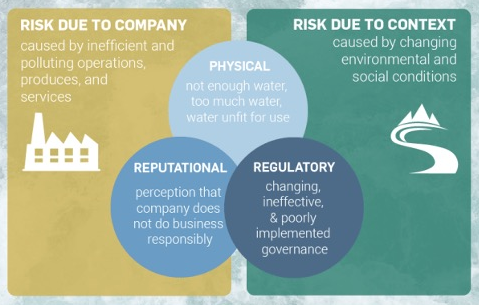By Carla Műller-Zantop (Danone S.A.), Michael Matosich (The Nature Conservancy), Kari Vigerstol (The Nature Conservancy), Naabia Ofosu-Amaah (The Nature Conservancy), and Gregg Brill (Pacific Institute and CEO Water Mandate)
The Problem

As large users of natural resources, including water, the private sector has disproportionate impacts and dependencies on natural capital1. These impacts and dependencies play out across physical, reputational and regulatory factors, and across the interface between company risks and risks due to a particular watershed. All of these issues affect private sector bottom lines and long-term well-being.
The private sector has a critical role to play in addressing many environmental, social, and economic challenges faced today. To this end, a multi-organizational project (including the CEO Water Mandate, the Pacific Institute, The Nature Conservancy, Danone, and LimnoTech) is looking to understand the opportunities for businesses to invest in nature-based solutions (NBS) to address societal challenges. The project team have recently published a Benefit Accounting of Nature-Based Solutions for Watersheds Landscape Assessment to better this understanding. This assessment:
- Explores the concept, definitions, and classifications of NBS;
- Identifies the barriers to scaling NBS;
- Reviews available frameworks or methods for evaluating, measuring, and demonstrating the value of NBS benefits; and
- Examines opportunities to scale NBS.
Using Nature to Solve Societal Challenges
Historically, the private sector has addressed water security through developing engineered solutions to store, treat, distribute, and dispose of water. Although many of these solutions have proven successful at meeting their primary objectives, they come at considerable costs to business and the environment. For example, a reservoir or dam may be built to store water. This water needs to be pumped to treatment works and then on to the end user. All of this infrastructure comes at considerable capital and maintenance costs. The environmental costs are significant too2, and include loss of habitat, changing local hydrology, and disposal of wastewater to the environment. It is seldom the case that the full suite of costs (economic, social, and ecological) are factored into decision making when investing in engineered solutions.
But the reliance on solely engineered solutions to solve critical water challenges is changing. The private sector is increasingly realizing that it has, at its fingertips, various approaches that rely on nature – not just engineered solutions – to build water security in line with their existing business models.
These approaches are known as “nature-based solutions.”
The private sector is increasingly realizing it has, at its fingertips, various approaches that rely on nature – not just engineered solutions – to build water security in line with their existing business models. These approaches are known as “nature-based solutions.”
Nature-based solutions (NBS) are actions to restore, manage, and protect natural ecosystems in order to secure ecosystem goods and services that nature provides and performs. Working with nature offers significant opportunities to businesses to meet broader environmental, social, and economic objectives. Instead of relying solely on traditional “gray infrastructure”, companies can combine these efforts with natural solutions or “green infrastructure” (e.g. using wetlands to filter and store water, rather than industrial filtration systems and storage tanks). This allows natural systems to provide vital provisioning and regulatory functions, such as filtration functions of soils and natural vegetation to:
- Improve water quality;
- Reduce erosion and sediment loading;
- Lower pollution into waterways and groundwater; and
- Regulate seasonal water flows.
Investments in NBS can offer solutions that are both cost-effective and flexible, and are therefore of increasing interest to the private sector and other stakeholders. NBS allow ecosystems to provide water quality and quantity benefits, as well as multiple other co benefits including carbon sequestration; increased biodiversity; and social, cultural, health, and economic benefits3, 4. In addition, carefully planned natural climate solutions using NBS have the global potential to deliver 37% of carbon mitigation5 needed within the next decade to stabilize global warming temperatures to below the 2° C target.
Unique Opportunities for the Private Sector
As the private sector prioritizes building resilience, more and more companies are turning to NBS to support their long-term goals and business continuity objectives. According to GreenBiz6, over 350 companies have made commitments to help reverse biodiversity loss and restore natural systems on which economic activity depends. In 2019, Amazon7 pledged USD $100 million to support natural climate solutions, while Unilever8 pledged €1 billion towards its climate and nature fund in 2020.
As the private sector prioritizes building resilience, more and more companies are turning to nature-based solutions to support their long-term goals and business continuity objectives.
To improve the sustainability of business operations as well as the environment, it is critical that more companies invest in the enhancement of natural capital and the use of NBS to create more resource-efficient societies.
So what is holding the private sector back?
Barriers to Private Sector Implementation of Nature-Based Solutions
While NBS can substantially improve ecosystem functioning and quality, they currently remain underutilized, partly because of:
- A lack of understanding of the full range of potential benefits of NBS, from both an ecosystem perspective and a business perspective;
- A lack of common metrics for measuring or quantifying the multiple benefits derived from NBS;
- A lack of public and private sector policy and governance frameworks and tools for identifying or monetizing the full scope of benefits and co-benefits provided by NBS; and
- Limited financing for NBS projects or a lack of incentives for investing in NBS.
For a more in-depth look at the challenges and barriers companies are facing, please refer to the Benefit Accounting of Nature-Based Solutions for Watersheds Landscape Assessment.
The Way Forward
It is clear that in order to sustainably meet the needs of the private sector, society, and nature, and to ensure that companies build long-term economic resilience, we will collectively need to improve ecosystem functioning and quality. Action needs to be taken now, to not only improve ecosystems at broad scales, but also embrace nature in solving many of the challenges we face today.
Action needs to be taken now, to not only improve ecosystems at broad scales, but also embrace nature in solving many of the challenges we face today.
To achieve these goals, the public sector could:
- Create appropriate regulations, policies, and legislations that promote the use of NBS;
- Provide development incentives, payment for ecosystem services schemes, stormwater fee discounts, green bonds, and tax increment financing;
- Adjust building codes and project development protocols to encourage the use of NBS;
- Enable credit enhancement and provide grants, rebates, and favorable financing terms; and
- Create collaborative governance and management mechanisms to promote partnership development around NBS investments9.
Businesses can advocate for these NBS-friendly policies and raise awareness of this opportunity through:
- Investing in NBS projects at scale with innovative sustainable financing;
- Supporting public-private partnerships and collaborative governance structures; and
- Providing sector leadership by encouraging other companies in their economic sectors or within their supply chains to support NBS opportunities10.
NBS have the potential to drive transformation in the private sector to meet long-term resilience goals. Companies can use these solutions to reshape their economic models to include added value from natural and social benefits while simultaneously achieving economic growth. To do this, they should look beyond the boundaries of their factory fences and broaden positive influence at the watershed level using nature as inspiration. No single business or government agency can tackle the multitude of societal and environmental challenges alone. In this context, NBS can support collaborative governance objectives, at a time where joint action is needed more than ever.
[Pull quote: Companies can use nature-based solutions to reshape their economic models to include added value from natural and social benefits while simultaneously achieving economic growth. To do this, they should look beyond the boundaries of their factory fences and broaden positive influence at the watershed level using nature as inspiration.]
For more information on the Benefit Accounting of Nature Based Solutions for Watersheds project, please visit the Benefit Accounting of Nature-Based Solutions for Watersheds project page.


